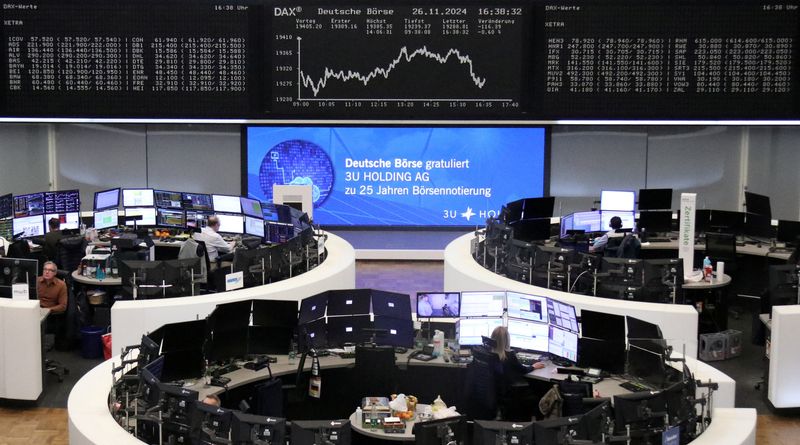By Joao Manuel Vicente Mauricio, Ankika Biswas and Pranav Kashyap
(Reuters) -French stocks hit a more than three-month low on Wednesday as investors fretted about the fragile government's ability to push through its budget, while continued worries over potential U.S. tariffs kept European automobile stocks under pressure.
The pan-European STOXX 600 closed 0.2% lower.
France's main stock index dropped more than 1% during the session to hit its lowest since August. It closed 0.7% lower.
The technology sector was the biggest weight on the STOXX 600, with declines led by French companies.
French bonds also took a hit, driving the premium the government must pay for long-term borrowing to its highest since 2012.
"France continues to struggle from political instability, and nothing has been sorted by the early election called by (President Emmanuel) Macron earlier in the year," said Lilian Chovin, head of asset allocation at UK private bank Coutts.
"The budget hasn't passed yet and the new government could fall again - that would make sentiment even worse with regards to French assets."
Far-right leader Marine Le Pen has been threatening to topple the government over measures to cut spending and raise taxes in the budget.
Investors also continued to worry about the next potential target for tariffs, after U.S. President-elect Donald Trump pledged big tariffs on imports from the United States' largest trading partners, including Mexico and China.
This concern, prominent since Trump's election victory, has kept European stocks on the defensive, among other factors.
Rate-sensitive real estate stocks gained 1.7%, though, limiting overall losses.
Among individual stocks, Johnson Matthey (LON:JMAT) slumped 11.7% after the catalytic converter and pollution filter maker missed estimates for half-year profit.
Grifols (BME:GRLS) fell 9% after a report said Canadian investment fund Brookfield might drop its plan to take over the Spanish pharmaceutical firm.

U.S. consumer spending increased solidly in October, suggesting that the economy maintained its strong pace of growth early in the fourth quarter.
This came a day after the Federal Reserve's November meeting minutes showed officials agreed to avoid giving much guidance on how monetary policy is likely to evolve. [.N]